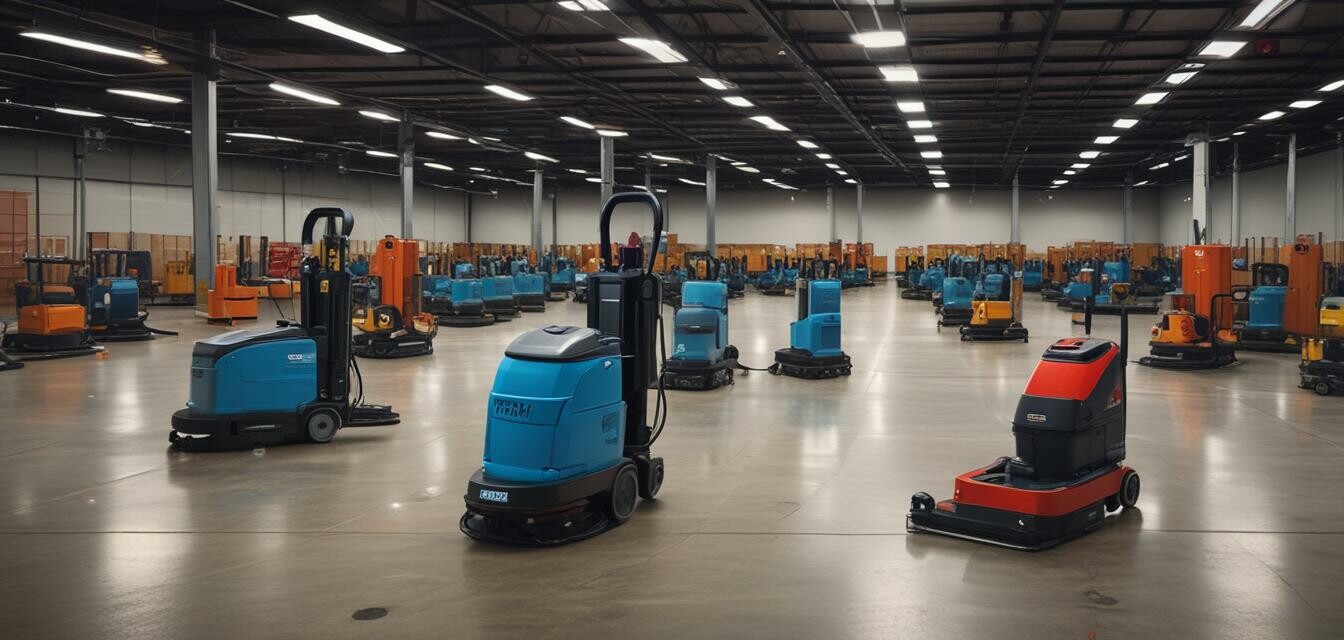
This article was generated using AI and is based on real customer reviews from the Amazon platform. It contains affiliate links, meaning we may earn a commission—at no extra cost to you. As Amazon Associates, we earn from qualifying purchases.
The Importance of Regular Maintenance for Industrial Floor Care
Key Takeaways
- Regular maintenance ensures optimal performance of industrial floor care equipment.
- Neglecting maintenance can lead to costly repairs and reduced lifespan of equipment.
- Implementing a maintenance schedule can enhance cleaning efficiency and effectiveness.
- Understanding the specific maintenance needs of your cleaning gear is vital for longevity.
- Consistent upkeep promotes safe working environments by preventing accidents.
In the world of industrial cleaning, the equipment you use plays a pivotal role in maintaining cleanliness and safety. Regular maintenance of your industrial floor care tools isn't just a suggestion; it's a necessity. This article will delve into why regular maintenance is crucial for the effectiveness and longevity of your cleaning equipment.
Why Regular Maintenance Matters
Industrial floor care equipment, such as vacuum cleaners and scrubbers, undergoes rigorous use. Frequent operation under challenging conditions can lead to wear and tear. Here's why maintaining them regularly is essential:
| Reason | Explanation |
|---|---|
| Improved Performance | Regular maintenance helps keep equipment running at peak performance, ensuring cleaner floors. |
| Cost Savings | Preventive maintenance can reduce repair costs and prolong equipment life, saving you money in the long run. |
| Enhanced Safety | Well-maintained equipment is less likely to fail during operation, contributing to a safer work environment. |
| Increased Efficiency | Properly functioning tools allow for faster and more effective cleaning, increasing productivity. |
Common Maintenance Tasks
To maintain industrial floor care equipment effectively, certain tasks should be prioritized. Here are some of the most common maintenance activities:
- Inspection: Regularly check for visible signs of wear and tear.
- Cleaning: Keep the equipment clean to avoid clogs and malfunctions.
- Part Replacement: Replace any worn-out parts or accessories, such as filters or brushes.
- Lubrication: Lubricate moving parts to ensure smooth operation.
- Calibration: Periodically calibrate machines for optimal performance.
Creating a Maintenance Schedule
A structured maintenance schedule is crucial for effective upkeep. Here are steps to create one:
- Identify all equipment that requires maintenance.
- Determine the frequency of maintenance based on the manufacturer's recommendations.
- Assign team members to specific maintenance tasks.
- Track maintenance dates and outcomes to recognize patterns or recurring issues.
- Adjust the schedule based on the observed performance of the equipment.
Internal Resources for Maintenance Tips
Our Tips and Tricks category offers various resources to help maintain heavy-duty cleaning gear effectively. You can explore:
- Buying Guides for selecting the right maintenance tools.
- News and Trends related to advancements in cleaning technology.
- Carpet Extractors maintenance tips.
- Floor Scrubbers best practices.
- Industrial Vacuums upkeep instructions.
Effects of Poor Maintenance
Neglecting maintenance can lead to detrimental effects, not just on equipment but also on cleaning outcomes. Here are a few consequences:
| Issue | Effect |
|---|---|
| Reduced Cleaning Efficiency | Dirty or malfunctioning equipment simply won’t clean as effectively, leading to poor results. |
| Higher Operational Costs | Frequent repairs often require significant downtime, leading to increased costs. |
| Safety Hazards | Malfunctioning equipment can create hazards for operators and others in the vicinity. |
| Shortened Equipment Lifespan | Neglecting maintenance leads to premature wear, limiting the lifespan of your tools. |
Tips for Maintenance Success
- Keep records of all maintenance activities to track performance trends.
- Use high-quality replacement parts to ensure compatibility and durability.
- Train your cleaning team on proper machine operation and maintenance procedures.
- Establish a routine to minimize disruptions in your cleaning schedule.
- Incorporate feedback from users to enhance maintenance practices.
Conclusion
Regular maintenance of industrial floor care equipment is not only beneficial but essential. By investing time and resources into upkeep, you can ensure optimal performance, enhance safety, and prolong the lifespan of your products. Implementing a strategic maintenance plan will ultimately yield a cleaner, safer working environment for everyone.
Pros
- Ensures consistent performance.
- Reduces repair costs over time.
- Enhances safety for workers.
- Improves overall cleaning efficiency.
- Promotes a longer lifespan for equipment.
Cons
- Requires regular commitment of time and resources.
- Initial costs for tools and replacements can be high.
- May need training for staff to maintain effectively.
- Some maintenance tasks may become complex over time.
- Potential for equipment failure if maintenance is missed.